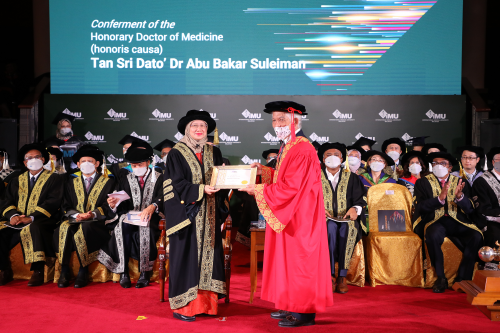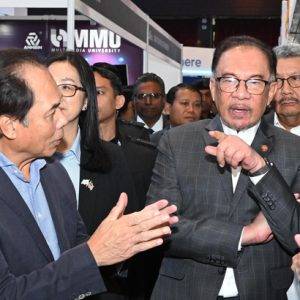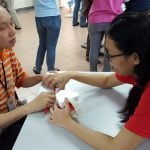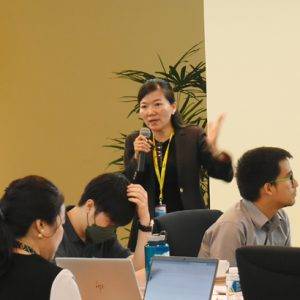International Medical University (IMU)’s Senior Advisor, Tan Sri Dato’ Dr Abu Bakar Suleiman was conferred a Honorary Doctor of Medicine at the University’s convocation on 24 June 2023 in recognition of his tremendous contributions to the nation and the IMU in the field of medicine and education.
CONFERMENT OF THE HONORARY DOCTOR OF MEDICINE
TAN SRI DATO’ DR ABU BAKAR SULEIMAN
MBBS (Monash), MMed (S’pore), MRACP, FRACP, AMP (Harvard), FAMM, FAMS, FRCP, FRCPE, FRCP (Glasgow), FRCPI, Hon FACP, Hon FRCSI, Hon FRCSE, FAFPM, FASc, Hon MD (Monash), Hon DMed Sc (UKM), Hon DSc (UPM), Hon PhD (UMS), Hon MD (Qld), DSC (HON) (SOTON)
24 June 2023 | IMU Bukit Jalil
“To be a good doctor, you must also be a good human being.” These are Tan Sri Dato’ Dr Abu Bakar Suleiman’s words – a philosophy that has guided him throughout his distinguished career in the Malaysian health service.
Leading the way
Having started out as a medical officer in 1969, Tan Sri’s progress is testimony to the strength of his calibre and leadership and his capability for innovation. By 1976, he was heading the Department of Nephrology at Hospital Kuala Lumpur (HKL) where he was also the first and only Nephrologist working under the Ministry of Health (MoH). This saw him having to take on both national and institutional agendas in matters pertaining to his field of expertise.
During his 11 years at HKL, Tan Sri developed the nephrology and dialysis centre which also served other hospitals in the country. As demand outstripped supply, Tan Sri then successfully canvassed the support of donors and non-governmental organisations to set-up a country-wide network of dialysis centres. He later introduced the innovative concept of self-haemodialysis – which brought the service to patient’s homes, offices and satellite clinics. This paved the way for large numbers of patients getting the treatment they needed at affordable rates.
Always at service
He left HKL to serve at the MoH as Director of Medical Services in 1987, then as Deputy Director General from 1989 and finally as Director General from 1991 till he retired in 2001.
During this time, he directed his attention to bringing patient-centred services to the fore, not because it was a buzzword, but because it was his mission to serve the people. He also focused on the development of human capital and emphasised the importance of research. He was the driving force for the progression of quality assurance in this country and initiated the accreditation of hospitals and of medical schools.
Known for his foresight, Tan Sri was appointed by the Prime Minister in 1996 to head a national taskforce on telehealth. He also led the initiative to apply Health IT applications and solutions in government hospitals and clinics which was instrumental in developing the first paperless and filmless hospital in Selayang in 1998. At that time – when “google” wasn’t even a verb — it was the most advanced of its kind in the world.
Developing the sector
Even with his dedication to his ministry responsibilities, his commitment to developing the healthcare sector saw him taking lead roles at the Malaysian Medical Association (MMA), the Academy of Medicine of Malaysia, Malaysian Society of Transplantation and Malaysian Society of Nephology. He is presently President, Board of Governors of the National Kidney Foundation.
At the MMA, he was part of a committee in 1979 that completed a landmark study on health services in Malaysia. The study “Future of the Health Services in Malaysia” helped form many policies and procedures in the public health system.
He also had an unwavering pursuit to ensure quality, scholarly activities and continuous learning among Malaysian medical professionals. This, he believed was the way forward for the future and Tan Sri in his capacity as the president of the Malaysian Medical Council ensured that the Continuing Medical Education initiative was launched in 1995.
Later in the year 2000, he was pivotal in setting up the National Specialist Register (NSR). The aim of the NSR was to ensure that doctors designated as specialists were appropriately trained and fully competent to practise at the expected higher level of care in their chosen specialty. It also provided the public with an avenue to identify relevant specialist doctors, ensuring better transparency, efficiency and service.
Out of retirement and into the IMU
Upon retiring from government service, Tan Sri joined the International Medical University (IMU) in 2001 as its president. Under his guidance, the IMU launched its healthcare services that fulfilled the dual role of providing care for the community while supporting clinical training and enabling clinicians and healthcare practitioners to further develop their skills.
He has also been instrumental in the development of new learning initiatives – including those promoting professionalism and ethics, clinical and communication skills, information management and independent learning – and in driving the incorporation of e-learning in the university.
With Tan Sri’s guidance, the IMU has been playing at the top of its field, achieving the ISO 9001 and ISO 17025 certificates and a Tier 6 (outstanding) status under the national Setara rating system. He has also created a research-rich environment – the IMU generates over 100 publications and 200 scientific presentations annually.
Never tiring
Tan Sri stepped down as President of the IMU in 2017, but still journeys with the IMU as a Senior Advisor. Even in retirement, his wealth of experience and wisdom remains key to the IMU as well as in the country’s health and education sectors. He has not stopped actively participating in various national and international platforms and presides on various national committees including being a member of the national advisory council under the Ministry of Health. Till today he continues to identify and mentor the younger generation to be leaders in their respective fields.
While these paragraphs cannot contain all that Tan Sri has contributed to the people, the healthcare sector, the IMU and the country, perhaps the one achievement that has enabled him to accomplish all this is what he has always carried with him in his heart: that to be a good doctor, you have to be a good person.

ACCEPTANCE SPEECH
on the occasion of the award of the Honorary Doctor of Medicine degree by IMU on 24 June 2023
I wish to thank the International Medical University (IMU) for the honour of being bestowed with the honorary doctorate today. IMU is a special institution with great staff, all committed to enable our students to excel. It has been a privilege to be part of IMU for the last 22 years.
Congratulations to all graduates and their families. Today is a very special day as you, new graduates, move on to the beginning of the next phase of your life.
Have your dreams, but it cannot remain as dreams! With your dreams you must have goals to be achieved – life goals, annual, monthly, even daily goals. Then work hard, be disciplined, consistent, persistent to achieve your goals. By graduating today all of you have the potential to achieve your goals and realise your dreams.
What does the future hold for us?
As the health sector move into digital health and digital medicine, there will be great uncertainty and great change, as the health system of the last century makes way for the health system of this century. There will be great resistance to change of course, even by many sitting in this auditorium. This is to be expected, and many will have to be dragged screaming into the future!
You will all quickly realise that much of what you have learnt upon graduation, has started to become less relevant. I sincerely hope that all of you have learnt how to learn, and is comfortable with that. Your learning has to continue indefinitely if you are to develop yourselves and contribute to the workplace, to the community and to the economy in this rapidly changing world.
In the years ahead, you will be faced with situations where you have no expertise, no evidence base to rely on, and you fear your intellect will not provide the needed answers. Be brave, continue to work for solutions, obtain help from and learn from others, and be innovative. In challenging situations, working with others, and for others, remember that empathy and kindness are true reflections of emotional intelligence, which can pave the way to success for you and your team.
We all live in a troubled world, faced with threats to democracy, the climate catastrophe, and widespread racism. How do we get to know the truth when mainstream media and governments have their own versions of it, and trust all round is at an all-time low! How do we differentiate facts from fakes?
With these type of challenges and more, you will all be faced to fight for integrity, humanity and dignity, if you wish to make a difference!
In working for our patients, for the community and our country, let us accept our differences, but let us focus on our common interests, and to the means by which we can help to resolve the differences. We should try to make diversity our strength and cherish our children’s and grandchildren’s future.
I wish all of you great success in your future endeavours.
Tan Sri Dato’ Dr Abu Bakar Suleiman









